We have hit the point where search engines are playing a central way in how we perceive the world, especially in regard to online video news. You don’t know something? Go Google it is the default reaction. A single search engine which has 92% worldwide market share, is our main source of answers to our questions? While there are also other options despite Google’s market domination, only few offer results of their own.
Whether intentionally or unintentionally, search engines are more likely to provide certain results over others and that’s definitely worth our concern. While search engine bias is a book-length topic, we will look here at the more manageable video search results.
Google/YouTube alliance, or is it?
Eric Enge, the SEO specialist and founder of Stone Temple Consulting made an experiment testing YouTube’s prevalence in Google’s search results. Let’s see how Google/YouTube alliance alone faired.
Unsurprisingly, YouTube videos ranked in the top 10 results far more frequently than any other videos, either self-hosted of hosted on competitive video platforms. Enge’s experiment included 6,145 queries that were most likely to generate video results, including words like video/clip or “how to”. To say that the result of Enge’s experiment didn’t shock me at all would be an understatement. Frankly, 88% of top 10 videos were from YouTube, either native of embedded, furthermore, YouTube results exceeding 50% prevalence reached the top 30 benchmark.
From all the queries, 400 included the word video or clip. How has it turned out for them? “Only” 78.9% of the top 10 were from YouTube, while zero YouTube videos ranked out of the top 30.
There isn’t a conclusive way how to explain YouTube’s dominance in Google’s search results, but Eric Enge suggests that it might be caused simply because YouTube has, unlike others, superior SEO. Lastly, if an organisation really wanted to create something to compete with YouTube, they would have to invest over $100 million, based on this Pubcon conversation between Eric Enge and Gary Illyes.
On the other hand, Sam Schechner, Kirsten Grindand and John West of The Wall Street Journal think this all isn’t by accident. To support this claim, they conducted an experiment of their own, presented in their dedicated article.
Basketball star Zion Williamson, the very same video, different results. What happened? National Basketball Association posted a video of Williamson’s pro debut. On Facebook the clip enjoyed more than million views and nearly 900 comments. On YouTube, though, video with the same title didn’t attract such attention, scoring only 182,000 views and 400 comments. Google prioritised YouTube results nonetheless. When they reproduced this experiment with selection of other videos and channels, in vast majority of cases YouTube results were once again more prominent.
Unsurprisingly, Google’s spokesman Lara Levin denied allegations made by Journal, although many additional factors stand against Google. Focusing on gamers, Journal picked popular videos from Facebook Watch, Twitch and Dailymotion, similarly to the previous experiment. Unsurprisingly YouTube ranks ahead of its competitors in every case. Lastly, the methodology used by The Wall Street Journal was approved by Dirk Lewandowski, a professor at Hamburg University of Applied Science, who also studied Google’s bias.
But the list of Google-YouTube bias allegations seems endless with rather long history. In 2008, Mark R. Robertson, a founder of ReelSEO (now Tubular Insights), also dedicated an article to criticism of Google’s bias concerning video results. However, Sherwood Stranieri (Robertson refers to in his article) doesn’t see things so bleakly, suggests that the YouTube’s prominence in Google’s results may be caused by different aspects than simple bias:
The very high average ranking for YouTube definitely raise an eyebrow. It’s pretty clear that even if Google’s algorithm is being objective, it’s been trained to respond to the characteristics that YouTube has in spades. It’s debatable whether this is a “bias” or just good design
Furthermore, Stranieri argues that the YouTube’s dominance in search results might be caused by the fact that it simply has more videos.
Last year, Dr. Peter J. Meyers also examined YouTube’s dominance in Google’s results on Mozilla blog, focusing on the visible slots of top 3 video carousel. He observed that YouTube dominated over 90% of the results, however, in his conclusion he speculates that it might be caused by speed of video loading among other factors. YouTube has faster loading videos than its competitors and that’s something Google values. It is unsurprising to find Mozilla acting as an apologist for Google, as Google pays Mozilla over $ 400 million a year to keep their search engine as Firefox’s default.
The dominance of YouTube videos in search results in Google remains overwhelming and astonishing.
How Google compares with other search engines
Happily there’s been some very serious work done on video search engine bias. Aleksandra Urman et al. have elaborate a comprehensive study focusing specifically on this topic. Google, Yahoo, Yandex, Bing, and DuckDuckGo: let’s see how these major search engines deliver video results and the proportion of video platforms. As one would expect, YouTube’s major competitors such as Vimeo and Dailymotion don’t appear in the sampled video search results of YouTube’s owners’ search engine – Google. However, there’s a twist to it.
From the broader perspective, Google might be not as biased towards the home YouTube team as it seems. In aforementioned Urman’s study, where multiple search engines were put through scientific scrutiny, authors conclude, that there’s a possibility that Google really doesn’t prioritise YouTube videos. It might be “just” downgrading the results of alternative video hosts.
On the good note, at least for Google, other search engines examined showed more limited source diversity; Google’s source diversity appeared to be twice as high. Yandex landed as the second most diverse search engine, however, only in case of English queries.
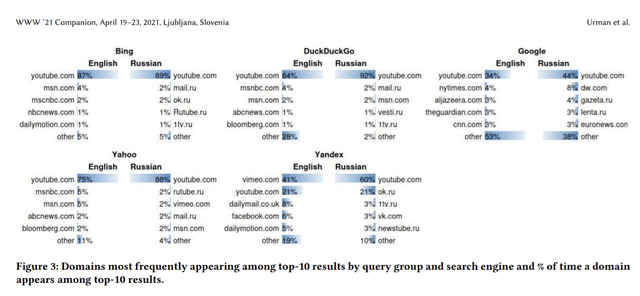
Results Using Virtual Agents
The study ascribes the results to Google’s promise to aim at more diverse search results from different domain names.
A new change now launching in Google Search is designed to provide more site diversity in our results. This site diversity change means that you usually won’t see more than two listings from the same site in our top results.
Interestingly, Urman’s study didn’t neglect a fact that Yandex is mostly occupied by Russian users and went an extra mile in the research precision, testing each search engine with both, English and Russian queries. While the language didn’t make much difference in most cases (YouTube dominance stayed untouched), Yandex was the most influenced by this factor.
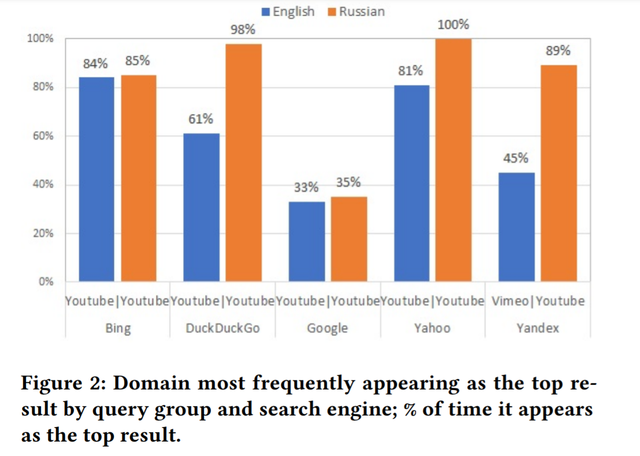
Results Using Virtual Agents
Our own testing
Finally, I tried to challenge this problem with the experiment of my own. We already know that Google is likely to prioritise YouTube videos, in spite of a fact that the very same video scores better on other platforms. But how about videos which are NOT featured on YouTube at all? While it is extremely hard to find a specific video which is simultneously featured on YouTube alternatives like Dailymotion, Vimeo, and Odysee, but not on YouTube, it’s possible to find a non-YouTube video on any of these platforms separately.
To start with, I found a video called “Drum Tech Central-Setup & Tuning Basics-1”, which is a part of “how to” series, exclusively on Dailymotion. This video was published 10 years ago, so the crawling speed of respective search engines shouldn’t be an issue in this case.
Dailymotion
Focusing mainly on alternatives to big players among search engines, the first one I decided to challenge was Brave Search – the one I use as default.
Usually when I’m entering general query in Brave Search, exclusively YouTube results will pop up. This might be caused by early state of Brave Search’s development so I would give them the benefit of the doubt. For now, Brave Search takes image results from Microsoft Bing and I assume it might apply also for videos, although I couldn’t find a specific answer. However, Bing usually shows mainly YouTube video results and Brave Search seems to follow suit.
Let’s see how Brave Search managed when challenged by the specific Dailymotion video.

Fortunately, this time the video showed up, however, what follows is a bunch of mostly YouTube videos – which doesn’t surprise me. But what results will I get when I enter general keywords?
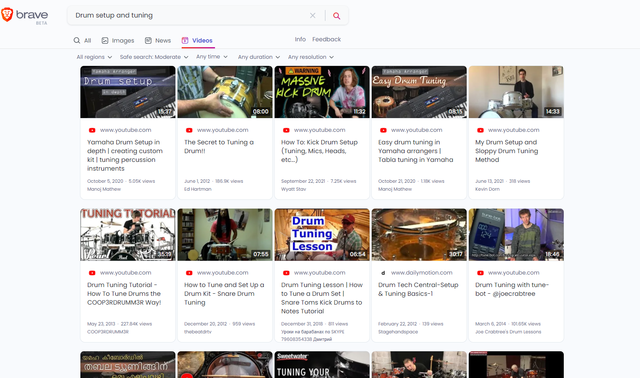
At once, the target video is ranked much lower, surrounded by YouTube alternatives. However, not as bad as I was afraid it would be, although I would welcome more diverse approach.
Mojeek is yet another search engines which takes pride in its own results and unlike Brave Search, it’s already fully developed. Unfortunately, Mojeek doesn’t provide video search section, but the general search didn’t do the trick either. After entering the examined video into the search bar, a lot of unrelated results appear, while the desired Dailymotion video is nowhere to be found.

How about DuckDuckGo? – probably the most popular privacy-oriented search engine. Surprisingly, the results are mirroring Brave Search, from video selection to ranking.

Originally, I was assuming that identical results in both, Brave Search and DuckDuckGo have something to do with Bing. Taking Microsoft’s search engine for a test search, though, results appeared to be completely different and monolothic. Not only I didn’t get what I was looking for, all the videos were taken from YouTube, no other sources.

This revelation shocked me. Moreover, giving Yahoo a try, which now takes results from Bing, it succeeded in delivering the specific video I searched for.

Moving on to the Bing proxy Ecosia, what I got is also unsatisfying, once again YouTube exclusivity and no target video. However, the results slightly differ compared to Bing.
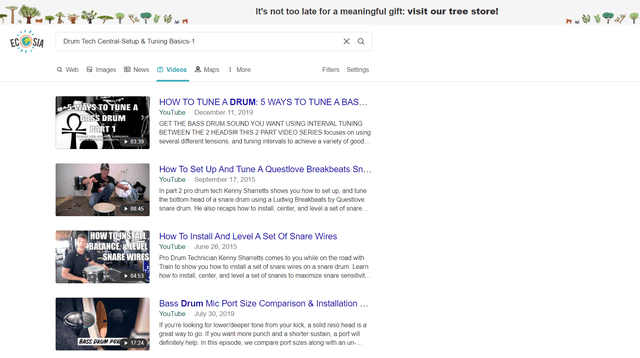
Interestingly, Swisscows, which also takes Bing results, provided the video I was looking for, although all the rest is just YouTube.

Qwant maybe? Let’s see what this privacy-first search engine does have for us.
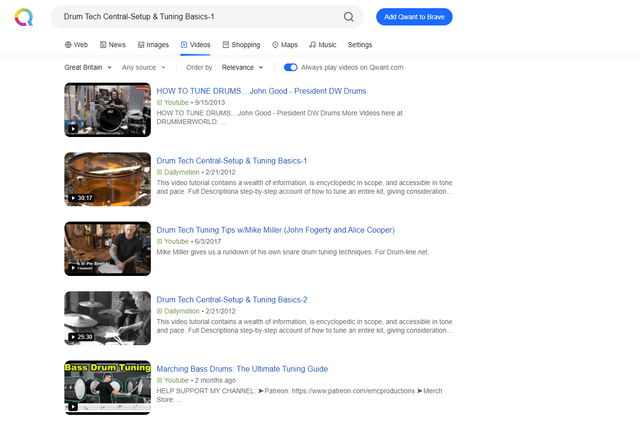
Although the searched video did not rank first, Qwant shows comparatively diverse results, YouTube and Dailymotion outputs split evenly. At the same time, Qwant is the only tested search engine which provided me also with following parts of the series, target video belongs to.
Moving away from the western search engines, I was very intrigued what will be results like in Russian Yandex.
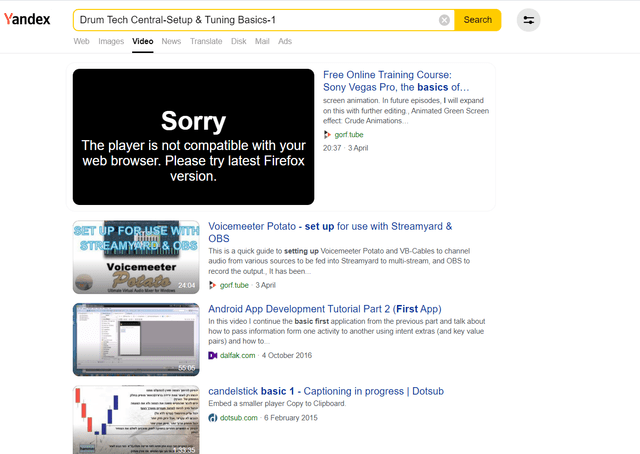
As expected according to my previous experience with Yandex, rather diverse variety of video hosting platforms and the absence of YouTube is what I got. Sadly, my target video, nor any other Dailymotion result didn’t make it there.
Concluding my Dailymotion search test with Google, let’s see how this giant fared.
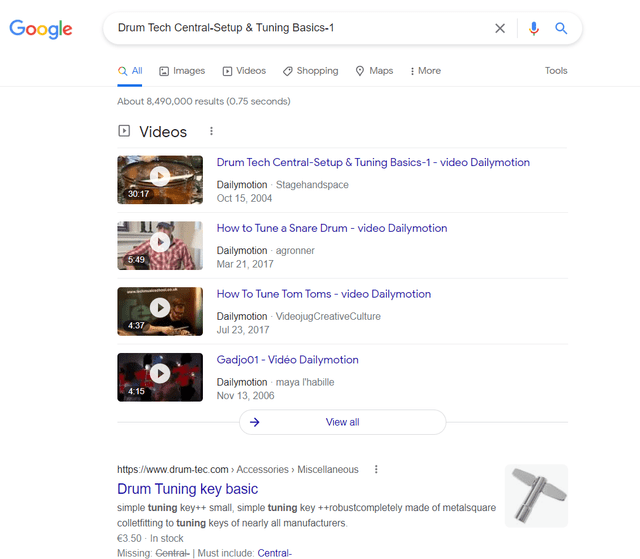
It indeed gave me what I was looking for, along with other topically related Dailymotion videos, but only in general search. Switching to the video search section, though, queried video is not included, not even on the second, or third page. At least, the YouTube prevalence isn’t as dominant, compared to the most of other search engines.
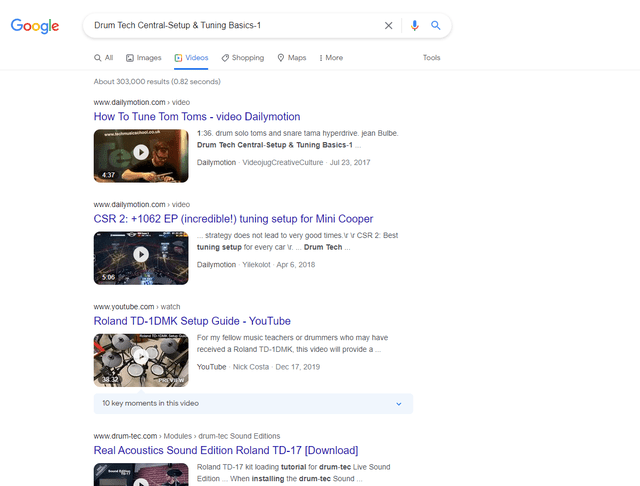
Being done with “Drum Tech Central-Setup & Tuning Basics-1”, I have to say that my observation met my expectations. Basically, Bing performed terribly, more or less on par with other search engines which rely on its results. Google, on the other hand, showed some light at the end of the tunnel, despite its poor reputation. Personally, I found Qwant output the most useful; the only set of results which offered also following videos of respective series along with other related Dailymotion results.
But this is just a warmup. I firmly believe that search engines should be able to find a specific video which isn’t new and has a high number of views. Unfortunately, some, especially Bing related search engines failed to do this task. So, how will these engines cope with less known niche video?
To test it, I found a Vimeo video called “RIEKANKY: Slovak Folk / Dance Show”.
Slovak folk dance on Vimeo
Bing indeed found several Slovak folklore results, however, the exact video I was looking for was nowhere to be found. Moreover, only YouTube results were included.

Similar scenario applies for Google:
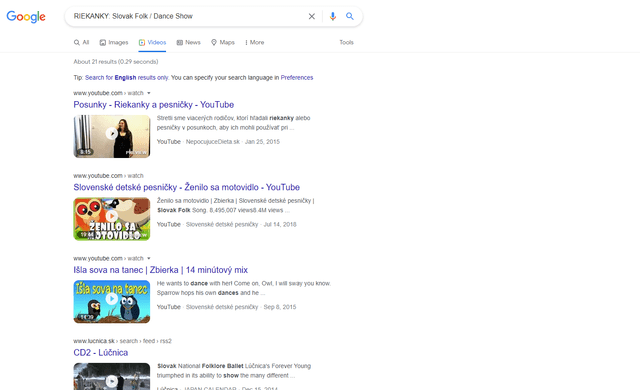
Would it be different with Yahoo? Let’s see:
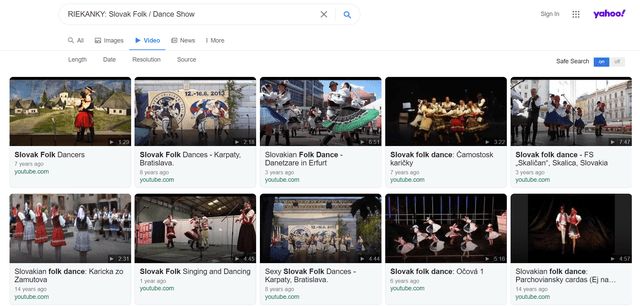
YouTube results once again, no Vimeo, nor any other competitive video platform. Maybe Yandex will save the day? Once again unrelated, but YouTubeless results:
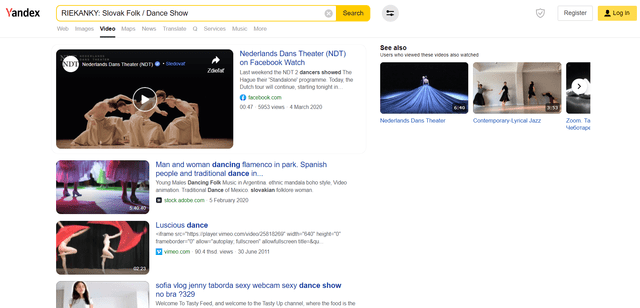
What baffles me, though, is a fact that Yandex indeed ranked a Vimeo video in the top 5, however, it’s not even close to the specific video I was looking for. A mystery. Because when I switch to the general search, voila, this low-rank Vimeo niche is pushed to the very top:
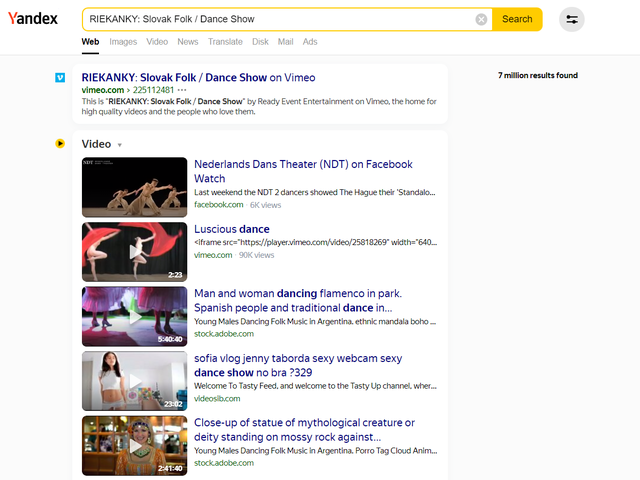
Finally, Yandex and Google are definitely not the only two search engines whose video search and general search drastically differ. I tried to look for the video also in the rest of tested search engines and several others provided more reasonable results in general search.
Ecosia:
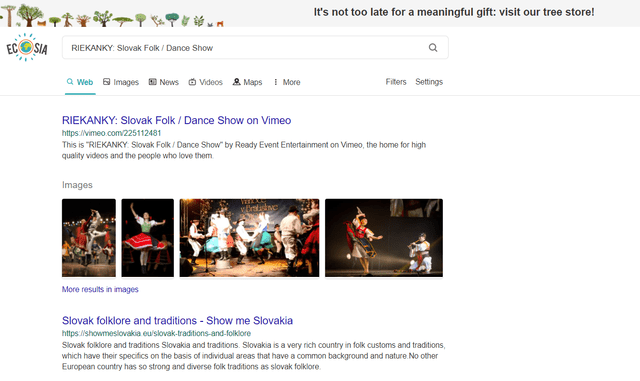
Bing:
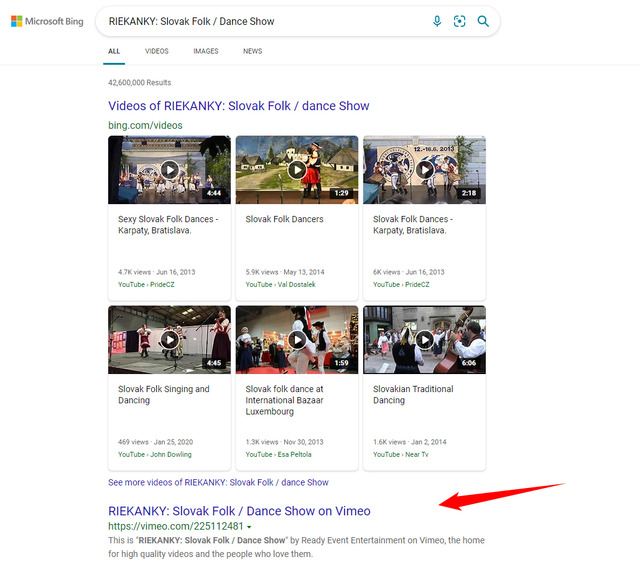
Qwant:
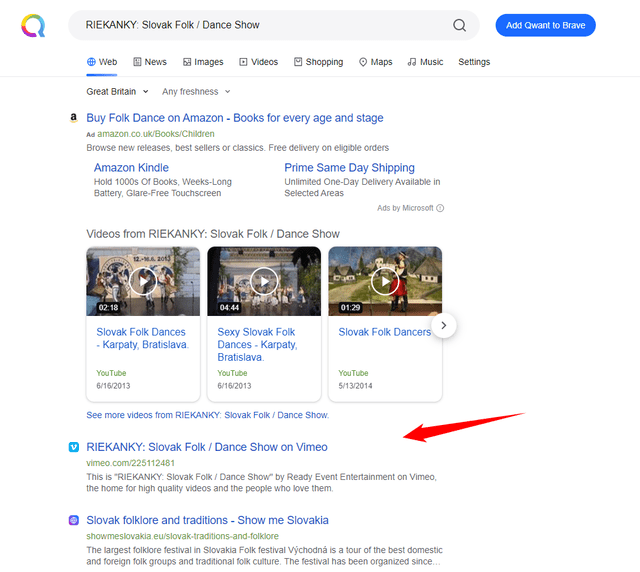
Remaining search engines, however, didn’t provide the result I queried, not in general search.
In conclusion, it’s evident that YouTube dominates video results all across the search engines considered. What shocked me is how incompetent search engines were to give me a specific video from non-YouTube source, even though it had nearly no views. I explicitly asked for it, knowing exactly what I’m looking for. That’s alarming, to say the least.
odysee
“How to fix overexposed photos in Adobe Lightroom” – that’s the video I tried on Odysee. Sure, Odysee is famed for its accpetance of ‘alternative’ content which wouldn’t fit into the constraints of strict YouTube rules, but still it has many neutral videos, like this one. It will be interesting to see how the search engines will perform if I query the specific ‘Odysee-only’ video, while having similar videos all over the web.
Shortly? NO search engine managed to find this specific video, nor any other result from Odysee. Really. It might be caused by the general nature of the topic, but search results I obtained across all the search engines were more prominently flooded by YouTube than ever before. Sure, YouTube has so many such videos, but there’s no video on YouTube, which would be identical to the one I searched for.
Once again, the most variable results were provided by Yandex, including no YouTube results except for the 1st video.
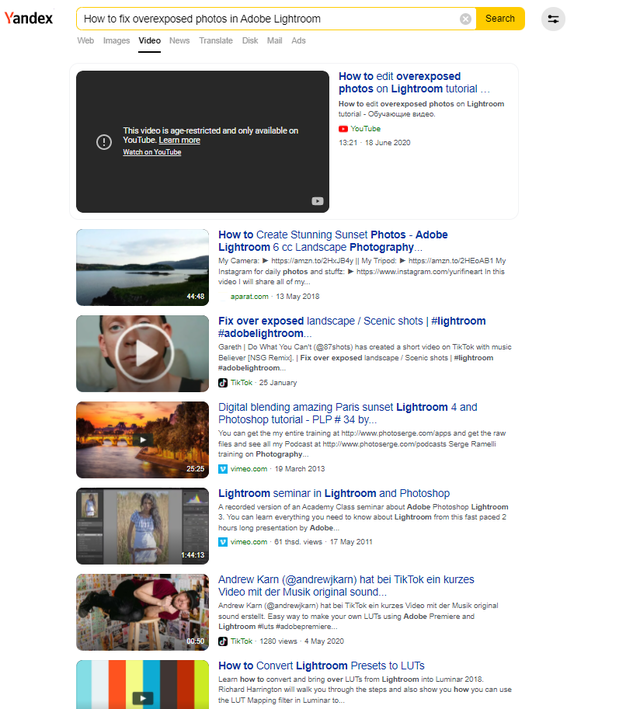
Besides Yandex, only Qwant gave me results other than YouTube, however, no Odysee and no specific video I entered into the search bar.

To prove that this absence of Odysee in video results isn’t caused by the general and highly covered topic, I decided to make another test with more specific and much longer title: “New Education Policy in India | 2020 Education System in India | Education News”. Once more, “Odysee-only” video and things didn’t appear to change. From mostly YouTube to exclusively YouTube results provided by nearly all the search engines, only Google, Yandex, and Qwant offered some variety, despite the results didn’t hit the right spots.
Shockingly, even switching to the general search didn’t help this time; each and every search engine included acted like Odysee doesn’t even exist.


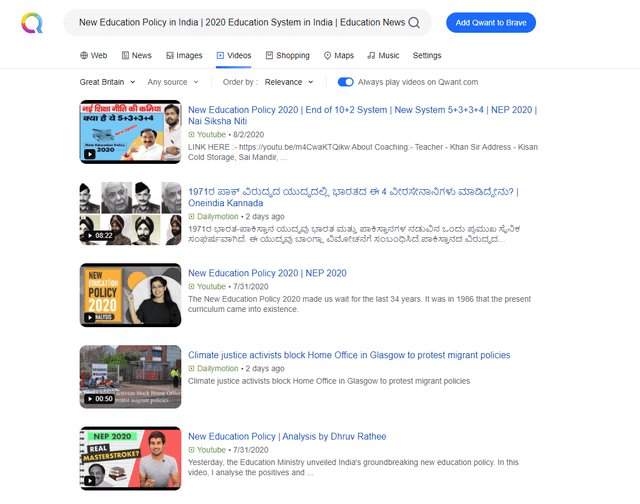
This nearly 50-50 rate of YouTube/Dailymotion videos in Qwant’s results is also interesting observation. To prove this point I tried a selection of various videos of various topics. Well, YouTube and Dailymotion prevailed.
“Dailymotion” video not on Dailymotion
To conclude my search engines testing, I found an interesting video. What’s so special about it? It includes word “Dailymotion” and explains how to make money on it. Plot twist? It’s NOT featured on Dailymotion. Actually, it appears to be only on Vimeo. So let’s try this lengthy title: “Dailymotion Earning Course 2015 – Make Money Online | Introduction of Real income from Dailymotion”.
Unlike in previous cases, Yahoo, DuckDuckGo and Brave Search showed me precisely this video. Only this video.
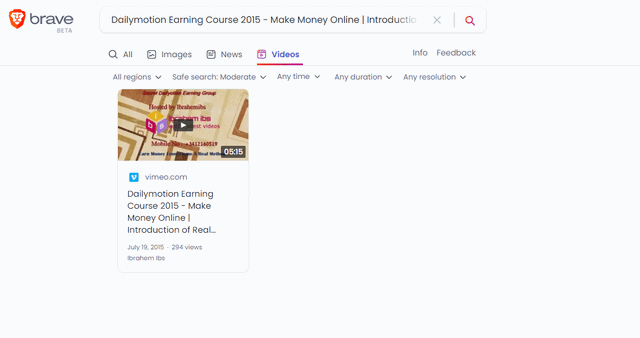
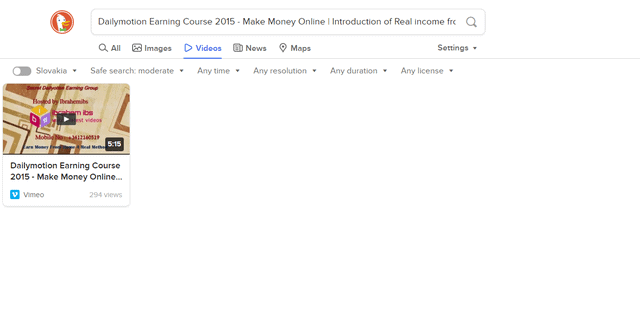
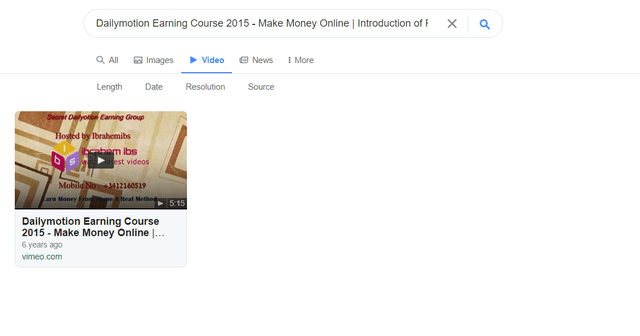
Google got seemingly fooled by the presence of the word “Dailymotion” in the title.
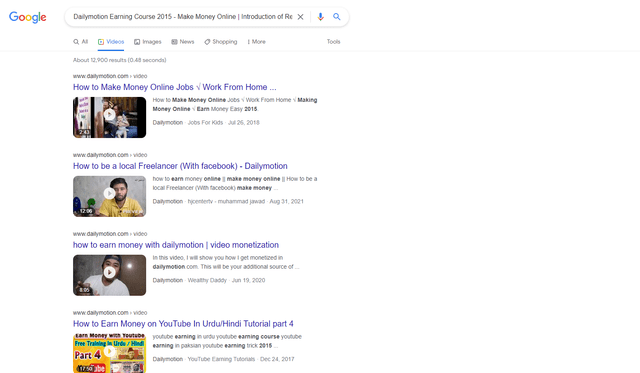
Strangely, Bing and Ecosia showed blank results, absolutely no results at all.
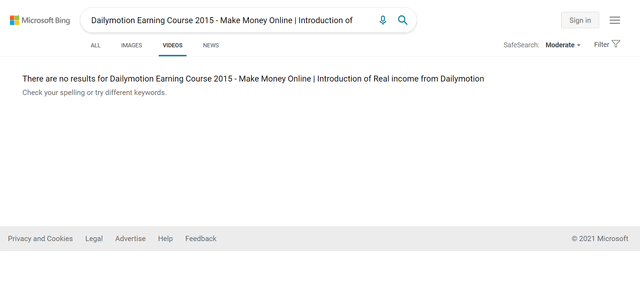

Qwant, on the other hand, stays adamantly true to its YouTube/Dailymotion formula, although the specific video I searched for isn’t featured on any of them.
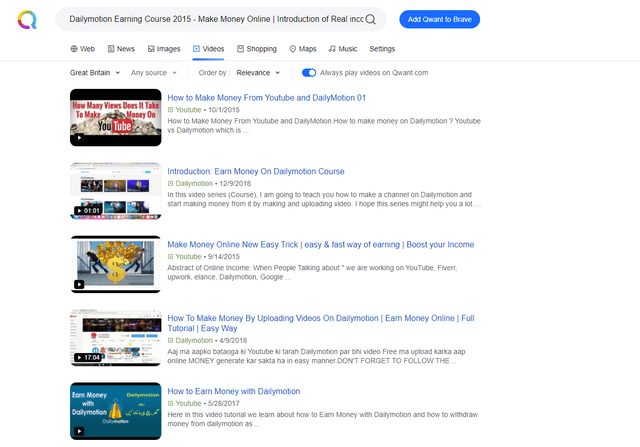
Yandex and Mojeek also didn’t break the character, providing vast variety of completely unrelated videos as before:


Most diverse video search engines: Google, Yandex, and Qwant
Regarding supposed Google/YouTube alliance, Alphabet’s search engine surprised me by performing in less biased manner than other engines, although the evident prevalence of YouTube results is still unwelcome. Is it caused by intentional “positive” bias towards YouTube? Or is YouTube simply too big and frequented to devour chances of any other struggling video platform? Opinions differ, but one thing is certain. Google isn’t as uniform as I suspected it to be. From all the relevant alternative search engines I tested only Qwant and Yandex showed certain level of diversity even though I wasn’t particularly satisfied with the results – after all, except for Qwant, which wasn’t included in Urman’s study, my observation only proved researchers’ point.
While Yandex was infested with irrelevant content compared to my query, Qwant was prone on providing related YouTube and Dailymotion results, although I asked for the specific Odysee/Vimeo video. This likeliness to deliver mostly Dailymotion videos aside from YouTube is at least questionable.
It’s not easy to address this shortly, but who’s the least biased search engine for videos? While it’s hard for me to admit it, Google does not seem to be as disastrous. Yandex could be considered as well, at least in terms of plurality. And from the “privacy first” (?) alternatives only Qwant might seem to perform in more or less acceptable way, except for a bit too high Dailymotion occurrence. At least I thought so. But…
I tried to brute force Qwant into giving me something different than YouTube or Dailymotion. Qwant failed.
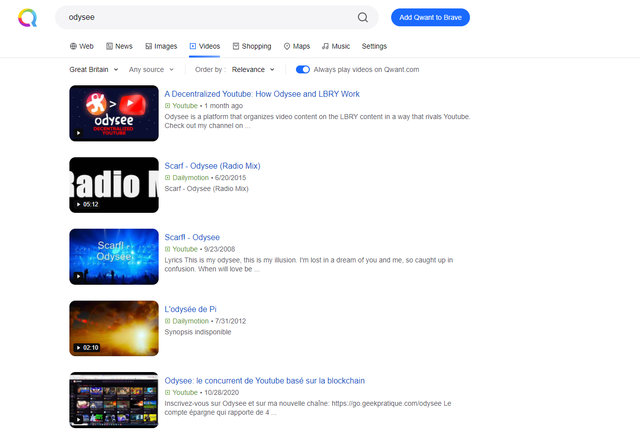
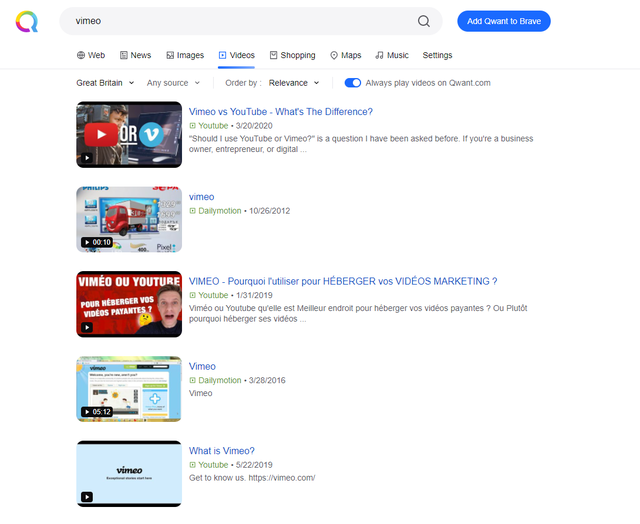
How often did examined search engines find the sought after video? Let’s see the tables showing either general or video search results:
| video search | Bing | Yahoo | Yandex | DuckDuckGo | Ecosia | Swaisscows | Startpage | MetaGer | Brave Search | Qwant | Mojeek | |
| Drum Tech Central-Setup & Tuning Basics-1 | no | no results | yes | no | yes | no | yes | unrelated | no | yes | yes | no |
| RIEKANKY: Slovak Folk / Dance Show | no | no | close | no | close | close | close | no | close | close | no | no results |
| How to fix the overexposed photos… | no | close | no | close | close | close | close | close | close | close | close | no results |
| New Education Policy in India… | no | no | close | no | no | no | no | close | close | no | no | no |
| Dailymotion Earning Course 2015… | no | yes | yes | no | yes | no results | no | no | yes | yes | no | no |
| general search | Bing | Yahoo | Yandex | DuckDuckGo | Ecosia | Swaisscows | Startpage | MetaGer | Brave Search | Qwant | Mojeek | |
| Drum Tech Central-Setup & Tuning Basics-1 | yes | no | yes | no | yes | yes | yes | no | no | yes | yes | no |
| RIEKANKY: Slovak Folk / Dance Show | no | yes | no | no | no | yes | no | no | no | no | no | no results |
| How to fix the overexposed photos… | no | no | no | no | no | no | no | no | no | no | close | no results |
| New Education Policy in India… | no | no vids | no vids | no | no | no | no | no vids | no vids | no | no vids | no vids |
| Dailymotion Earning Course 2015… | yes | yes | yes | no | yes | yess | yes | no | yes | yes | yes | no vids |
Leave a Reply